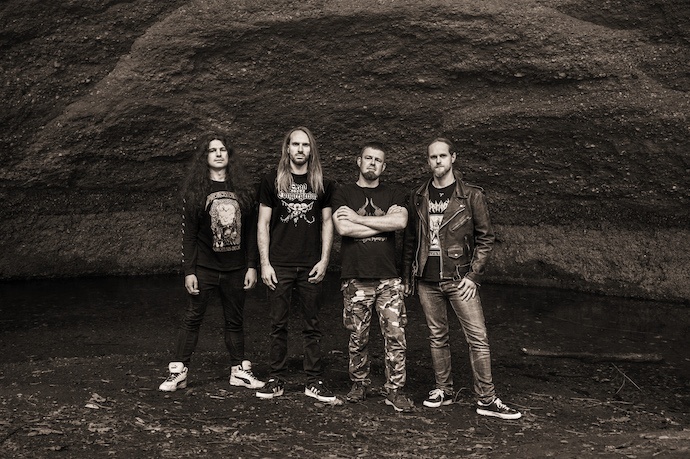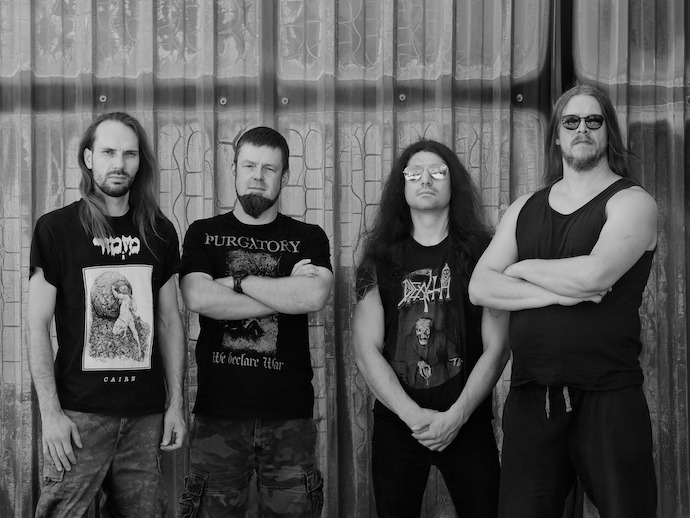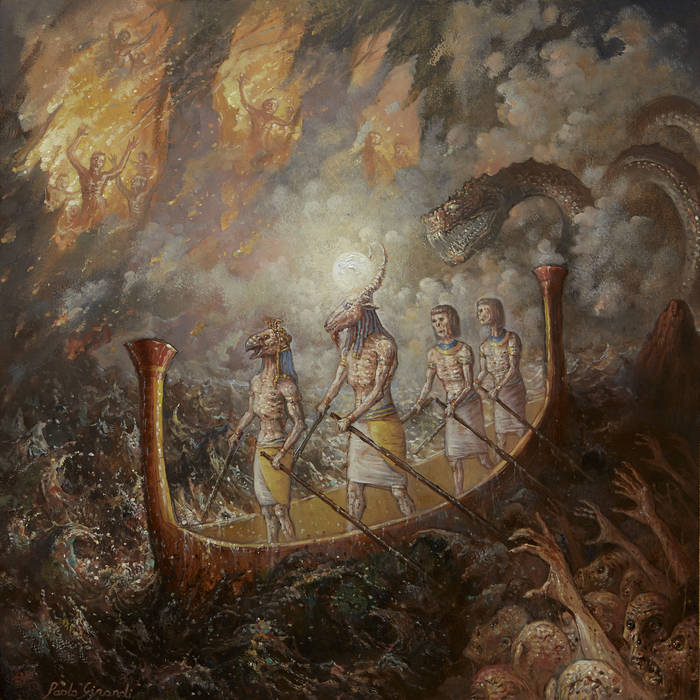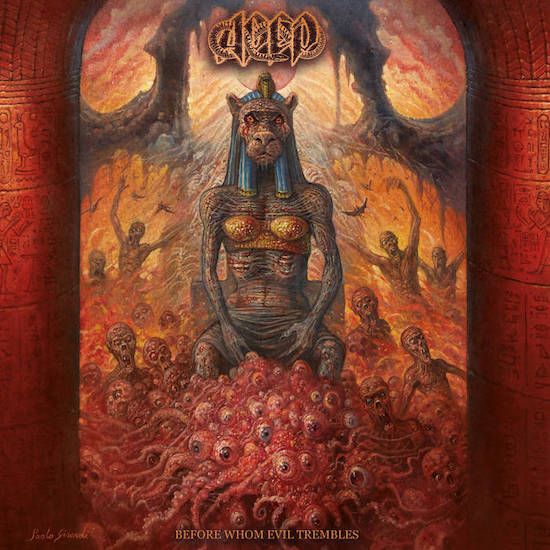
(As you will see from the interview below, our Comrade Aleks had a quite extensive and very interesting discussion with vocalist Christopher Fleckeisen and guitarist Oliver Pikowski from the Egyptian-themed German death metal band APEP, whose newest album was released on September 13th by War Anthem Records.)
Each metalhead should know names like Apep, Jörmungandr, Python or Typhon. Each deity personified primordial forces of Chaos in some forms and have kept the ability to inspire men of art through years, so to say. These names sound good for extreme metal bands, so the German Apep chose the rare one, the right one, which is intuitively clear for those who can connect Egyptian mythology and death metal.
Apep’s first album The Invocation of the Deathless One (2020) helped the band put down a fundament for the band’s reputation, and they returned in September 2024 in full arms presenting the sophomore album Before Whom Evil Trembles (Goddess of Carnage).
You know, doing an interview isn’t a rewarding experience each time you do it, but a proper, in-depth conversation is always worthy of efforts. And we had a really good one with Oliver Pikowski (guitars) and Christopher Fleckeisen (vocals). In the name of Sekhmet!
******
Hail Apep! How are you? What’s new in the Valley of the Gates of the Kings?
Oliver: Greetings! I guess we’re very fine because we just released our second full-length Before Whom Evil Trembles on September 13th and are very happy about it. We had a great release show with SINISTER, MESTICATOR and EPIDEMIC SCORN the day after and are now heading to some more live experiences.
Also we had a line-up change in summer. Our second guitarist, Philip, who was with us during the past 7 years left the band at his own request. The gap he left behind is now filled by Henrik from DENY THE URGE. We played the release show with the new lineup and the chemistry just works. So we’re looking forward for the upcoming venues!
I see that Henrik started to play thrash in Devoyd back in 1995, so I bet he has some new ideas to offer. Do you already discuss the way you’ll work on future songs?
Oliver: Henrik joined the band in August and so we have focused on rehearsing the previous APEP songs. We all agree that he is an excellent guitarist and that he certainly has a lot of potential. As soon as we start working on new material again, we will definitely discuss it. I am sure he will contribute to the songwriting in APEP just like our previous guitarist Philip.

Oliver, three of you started in the death metal band Carnage, which ended its existence in around 2016. What didn’t work with it?
Oliver: CARNAGE was founded many years ago as a just for fun band for me and some other musician friends. You can tell by the name that we were not very serious with it because we just wanted it to sound catchy, ignoring the fact that the original CARNAGE was an absolutely legendary band. The lineup also changed over time until we reached a point where we actually made some decent music.
Nevertheless I always worked on my guitar playing and Flecki was also a really good vocalist. During the last six months, our drummer was no longer available for performances for personal reasons. So Merlin, who was playing bass for us at the time, switched to drums, which worked surprisingly well. That was the point where we said to ourselves, we want to take the band to a new level.
Christopher: Like Oliver mentioned the time was right for the ending of CARNAGE. Right now, I say, this was definitely the right decision, I think we couldn’t reach the level which APEP now has with the old band CARNAGE.
And how did you form Apep after that? What was your idea from the start?
Oliver: Well, the basic idea was to have a more technical approach on old school death metal. Together with Merlin at the drums it was now possible for us to realize the more technical ideas and structures I had in my mind during the last years of CARNAGE. Some of the riffs from “Banishing Of Chaos” had been written and even rehearsed during the last half-year of the old band. So we decided to start all over from the ground. New name, as the old one seemed quite presumptuous, different approach to the songwriting, and so on.
Christopher and me always had a really big interest in old Egyptian mythology, “Lovecraftian” sagas and archaic rites and wanted to include this to our music. Something that was hardly possible with the old band. That’s how the overall concept of APEP emerged.
Speaking about Egyptian concepts, what’s for you on the first place – a cultural or spiritual aspect? How does death metal work with such topics?
Oliver: I would say we’re more on the spiritual side because our lyrics are mostly based on Egyptian ideas of the underworld and things that are related to them. Since we are not the first death metal band to deal with these topics, I would say it works very well. (haha)
You see, the underworld ideas of old cultures are often utterly brutal and so you might say they are a perfect fit for death metal lyrics. But it’s not only the brutality often associated with the old ages but also the mysterious and occult rites surrounding the whole topic. I really have a special interest in these things and want to transport this fascination through our music.
Christopher: The spiritual structure of the Egyptian mythology is really fascinating. And as Oliver mentioned, some of these archaic gods are really awful and the way they deal with the human race or with each other is really good stuff for death metal themes, so this combination works really good.
Well, weren’t you afraid that people would associate Apep with Nile? If it’s a problem at all.
Christopher: On the first hand a comparison with NILE of course is an honor. There are gods in the things they are doing. On the other hand, we want to implement a more unique sound, which of course is not easy for an Egyptian-themed death metal band. Some comments, in which we are compered to NILE, make me think that some people really didn’t get the point of our music or judged it a little bit too fast. We are big fans of NILE of course, but I would say we are far away from being a copycat, if that is even possible.

It’s interesting that Apep’s first album The Invocation of the Deathless One starts with “Whispers in Darkness”, the song based on the story of Lovecraft with the same title. How is H.P.’s mythology important for you?
Oliver: In short, a lot. Beside the Egyptian and other mythologies, the literature of H.P. Lovecraft is a very important source of inspiration for me. You can say that Apep’s texts so far consist of one-third each of Egyptian mythology, Lovecraft, and other inspirational sources. We always try to build certain narrative bridges. I really devoured these Lovecraft stories and so it was obvious for me to use some of this material for our lyrics. Not only is it a narrative source but it also puts me in the mood to write music for the band.
How does “Whispers in Darkness” fit the album’s concept? Why didn’t you pick up the “Imprisoned with the Pharaohs” story instead of it?
Oliver: It must be said that the first two songs are a re-recording of the original APEP demo. Both of the songs are not intentionally written for the album. The overall concept of The Invocation of the Deathless One is the idea of Apophis or “Apep” in old Egyptian language. Apep is the embodiment of darkness, dissolution, and chaos, which are reflected in many aspects of Egyptian religion but also in our modern conception of the universe.
It was clear to us from the beginning that we didn’t want to use ancient Egypt exclusively as a lyrical source for the band. When we designed the song concept in 2016, “Whisperers in Darkness” was simply a story that fascinated me a lot. I associated the cosmic horrors and abysses that Lovecraft describes in his stories with the concept of chaos and darkness.
Thus, the bridge has been built between Apophis and Lovecraft despite the fact that “Whisperers in Darkness” is about aliens and the mythological cult humans built around their colony. I could have chosen “Imprisoned with the Pharaohs” because it’s also an interesting story, but to be honest, I found it harder to make a good song text out of it. Maybe on the next album, we will see.
Do you see a chance to write a song based on Conan the Barbarian’s story for example? Or is following the “more serious” line of Lovecraftian mythology something preferable for you?
Christopher: Well there isn’t a 100% fixed concept for the lyrics in our songs. Sometimes the inspiration came from Lovecraftian mythology, sometimes from the Egyptian mythology, or sometimes just from an old video game that inspires me. So a “Conan” song cannot be ruled out. (haha)
By the way, do you see a rational grain in Egyptian “death culture”? For example, as I know, Bardho Thjodol, Tibetan Book of the Dead was studied by Carl Jung, and I read his comments on this topic, very in-depth ones with a good emphasis on psychological aspects and some theories about the conscious and unconscious.
Oliver: This is an interesting question and I’m not quite sure if I can answer it. I think a huge number of scientists are studying the Egyptian culture. Above all the strong focus on the afterlife, with its complicated rituals and liturgy. What we know about Egyptian culture is mostly based on archaeological findings, which are often badly damaged, and on the few text sources, most of which are underworld books. And these have mostly only been handed down from the New Kingdom. As far as we know, this culture is almost three times as old as Christianity and most of ancient Egyptian history is shrouded in mystery.
Even though I have studied the various books of the dead and the interpretation of the complex pantheon of gods and the tomb architecture quite intensively, I do not want to allow myself to interpret the psychology of the ancient Egyptians. I am simply not expert enough for that. This topic is so exciting and at the same time very complicated. Perhaps one day there will be a philosopher who will interpret the Books of the Dead. If it hasn’t happened already. I think that would be worth reading.
I see that you released The Invocation of the Deathless One on your own, but then it was re-released on tapes and vinyl by Darkness Shall Rise and Urtod Void. Did things progress as you expected after that? Did you get proper feedback after all?
Oliver: We’re still very grateful for the opportunity that Darkness Shall Rise and Urtod Void gave us. After recording our first album we had to make a decision on which physical format we wanted to release ourselves because our budget was very small. So it was sort of a happy coincidence that both labels offered us their resources to help releasing The Invocation of the Deathless One both on vinyl and tape. I’m glad they believed in the album and I would say it definitely paid off.
Shortly after our CD release Covid started to be a real problem in Germany and both the vinyl and the tapes came out mid-pandemic. I’d say therefore we had no expectation of how our album would impact to vinyl or tape collectors. Fortunately, both formats were very well received, although we could not play another concert in 2020 to promote our album. We did get a lot of positive feedback for our first album, and this motivated us to work hard on the new stuff.

The magnificent artwork of your new album Before Whom Evil Trembles is done by Paolo Girardi just like he did it for The Invocation of the Deathless One. How did you collaborate with the artist both times? Did you direct his imagination or did you just give him some key references?
Oliver: It was already clear to us during the production of the first album that we wanted Paolo for the artwork. He had already delivered a masterpiece here and so we chose him for the second album as well. Since our music is very conceptual, I usually already have a concrete motif for the cover in mind. So I would say that we are, in a way, directing his imagination.
However, I give him a lot of room for interpretation. For example, the motif of the new album: Sekhmet sits in the middle on her throne, the two pillars to the left and right, the damned in the background. We provide the general composition of the image. But the colors, the optical interpretation, and the detailed work, that is all up to Paolo.
That was a great choice indeed! Did you produce some merch with it?
Christopher: Yes! With the new record there will also be a shirt available with the painting of Paolo.
The Before Whom Evil Trembles recording session was split into a few parts — how did you organize everything?
Oliver: Actually it’s always a lot of computer work and it also takes a very long time because we don’t record continuously in a studio. At first, after we finished arranging the songs in the rehearsal room, I created a project in an audio recording program and recorded demo guitars. After that we started the first recording session in a friend’s studio in which the drums and drum effects were recorded. I then took the project with all the recorded drums home and recorded and reamped the final guitars. The same thing happens with the bass guitar, which a good friend of ours is recording in Berlin. Finally, the whole project ends up back in the studio where the vocal recordings are made. During the entire recording period, which lasts about half a year, we of course continue to rehearse and discuss the progress again and again.
Once all the recordings are finished, the whole thing has to go to a professional mixing and mastering studio. Nowadays, everything happens over the internet. Data transfer, agreements about the mix, etc., which allows us to do a lot from home. This is of course very convenient for family and work.
Didn’t you think to try and record some material live at the studio? Is it an option for Apep? Would it benefit the material’s sound at all?
Oliver: We’ve thought about it before, but there are several factors that make this approach rather unattractive for us. It would certainly make the recordings sound more like they were all of one piece. However, our songs are relatively long and sometimes complicated to play. Despite all the preparation, it’s a challenge to play them all together without making any mistakes and absolutely tight at every point.
Additionally, when I listen to the recorded parts, I often get ideas that I want to implement straight away. So some parts have to be re-recorded or corrected again and again. That would significantly increase the time we spend in the studio. In addition, we all do this as a hobby alongside our jobs and families and would have to travel from different cities. I think the way we organize our production is the most rational solution for us as a band.
Did you have a kind of special plan for the album? You know… like, did you want to surpass yourself or slightly change the direction – things like this?
Christopher: We didn’t have some “special plan” for this album. We just had enough good ideas together to get the next chapter going. Although we have to say that for the new album Before Whom Evil Trembles we wanted to create a more unique sound and songwriting, distanced from the “too far like NILE” comparison. We wanted to incorporate the experiences we’ve had so far with The Invocation of the Deathless One into the new record.
It seems that the band technically progressed a bit through the new material. How do you see this development from your point of view? Let’s say, how do you measure your progress?
Oliver: I think we grew together much closer as a band after the first album and honestly rehearsed even harder during Covid times. Also, I always tried to improve my songwriting and featuring new and unexpected elements. And as well, we definitely improved our playing techniques in general. All this surely pays off on the new record. But it’s hard to say we can actually measure our progress like the guitars are tighter or the drums are faster.
I think we all can agree that Before Whom Evil Trembles sounds more mature than The Invocation of the Deathless One, which is simply logical. Not least because of the tight and brutal mix and mastering.
As I understand, “Tombs of Eternity” is another Lovecraftian song in your list. What kind of message did you aim to channel through it? And again, how does it work with the album’s main motive?
Christopher: Sorry to disappoint you, but “Tombs of Eternity” is not a Lovecraftian song, although you can think it because of the title. This song deals with the old pharaohs and the way they have been send to the afterlife. Buried in magnificent burial chambers, under tones of stones. These “Tombs of Eternity” still outlast after thousands of years. What an interesting and in the same way uncanny imagination.
Thanks for the interview gents! May gods be kind to you and your endeavour. So, let’s sum it up: what are your plans for the rest of 2024?
Christopher: We still have a couple of show on our list for this year. And the first gigs have been planned for 2025. So hopefully, this time without any pandemic interruption please, we will play some more shows next year. If we could start our first tour with the new album in our luggage, we would be very happy. So keep your fingers crossed and thank you very much for the interview.
Oliver: Thank you for the interview and we’ll see you live!
http://www.facebook.com/ApepBand/
https://apep.bandcamp.com/music
